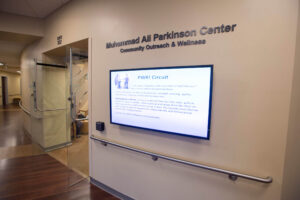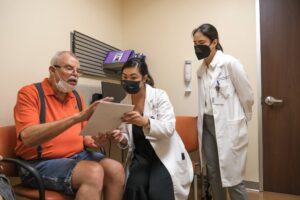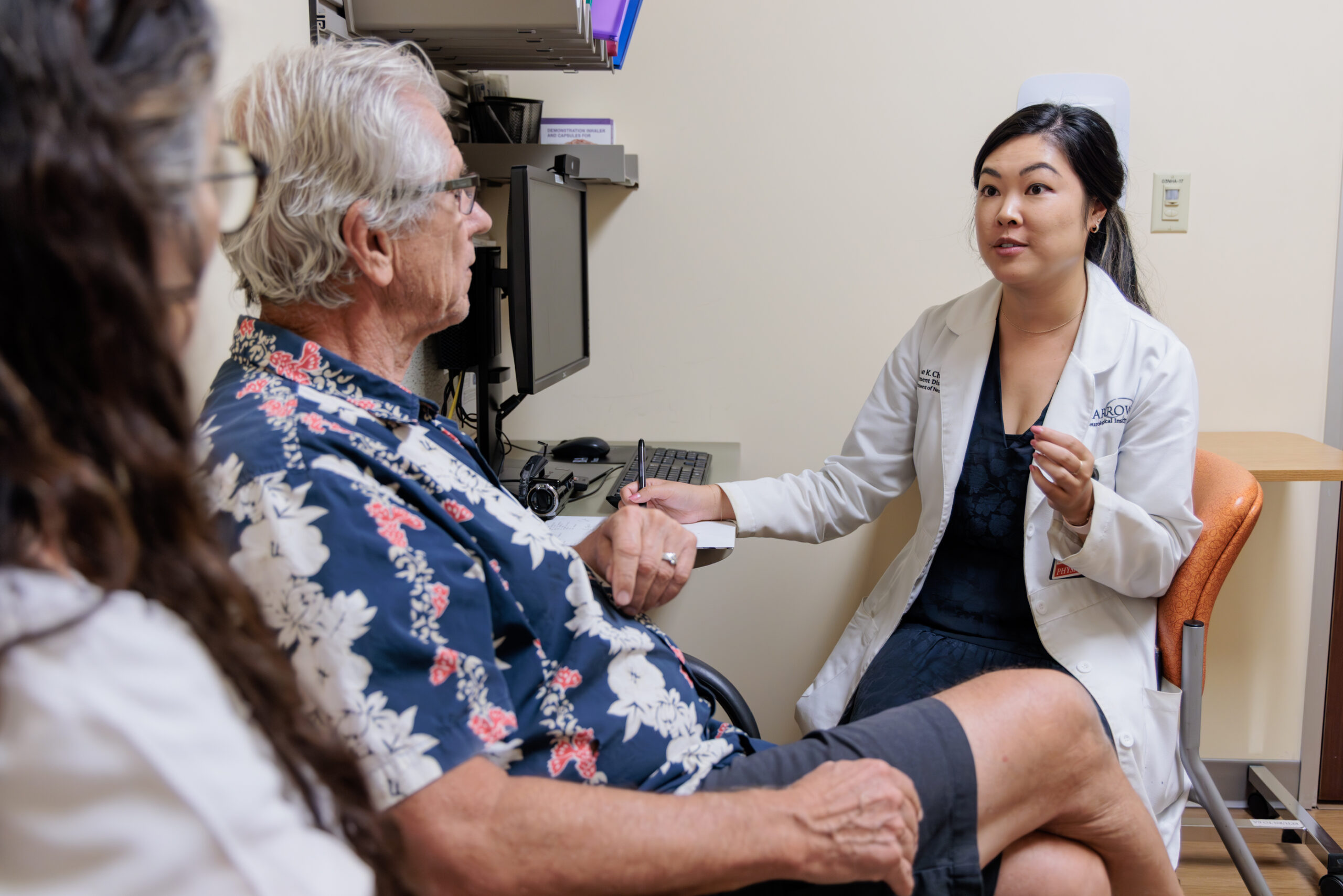A Parkinson’s disease diagnosis is a life-changing event for both patients and their loved ones. Parkinson’s is the second most common neurological condition, following Alzheimer’s disease, and affects more than one million people in the U.S. Each year, there are 90,000 new Parkinson’s diagnoses, and by 2030, it is estimated that 1.2 million Americans will be living with the disease.
Every patient’s experience with Parkinson’s disease is unique, as symptoms and disease progression vary from person to person. Many of us are familiar with the three “hallmark” symptoms of Parkinson’s: muscle stiffness, slowness, and resting tremors. As the disease advances, patients may also experience walking problems and difficulty with balance and coordination, making falls an ever-present worry among caregivers.
There are also non-motor symptoms of Parkinson’s disease. These include physical symptoms such as low blood pressure, smell loss, speech difficulties, and swallowing problems. The disease can also cause significant cognitive changes, including anxiety and depression, apathy, memory issues, visual hallucinations, and delusions. These “invisible” symptoms of Parkinson’s are arguably even more diminishing to quality of life than the motor symptoms.
While there is no known cure for Parkinson’s disease, patients and caregivers are far from alone or powerless. The Muhammad Ali Parkinson Center at Barrow Neurological Institute is committed to improving the quality of life for patients with Parkinson’s and their caregivers at every stage of the disease. As a Parkinson’s Foundation Center of Excellence, it provides comprehensive care and support services while pursuing innovative research to better understand and treat the disease. It is also a world leader in deep brain stimulation (DBS) for Parkinson’s.
A Legacy of World-Class Parkinson’s Care
Muhammad Ali and his wife, Lonnie Ali, had a vision to build a world-class Parkinson’s center dedicated to providing every patient who walks through its doors with the same expert care he was afforded during his Parkinson’s journey. Thanks to a transformational gift from The Bob & Renee Parsons Foundation, the Muhammad Ali Parkinson Center brought that vision to life in 2017 with the Lonnie and Muhammad Ali Legacy Care Program.
The Legacy Care Program provides advanced Parkinson’s patients and their caregivers with wrap-around care, including home visits and calls with nurses, advanced-care planning, virtual education and exercise classes, support groups, and end-of-life care. Since its inception, the Legacy Care Program has dramatically changed the lives of Parkinson’s patients who would otherwise not have access to the care they need. Moreover, it does so in a way that enables them to maintain their dignity, independence, and quality of life.
Parkinson’s Outreach and Support Services
The Muhammad Ali Parkinson Center has one of the country’s most robust community outreach programs. This includes its Hispanic Outreach Program, which reaches individuals in 18 countries. Patients in the Legacy Care Program can participate in any of these programs, which include virtual exercise and recreation classes, art programs, educational workshops, and support groups. Examples of patient-centered outreach and support services include:
- The Art of Moving
- English and Spanish PWR! Moves
- Tai Chi
- Stretching
- English and Spanish Voice Class
- Spanish Choir
- Music Therapy
- Mindfulness
- Parkinson’s 101 and 102 Seminars
- Newly diagnosed, young-onset, and advanced Parkinson’s support groups
The Legacy Care team also understands that needing a higher level of care can be overwhelming. To help make this transition easier, they introduced Legacy Care Welcome Packets, offered in English and Spanish, for new Legacy Care patients and caregivers. The welcome packets include an overview of the Legacy Care Program and its mission, a “meet the team” section, and a “what to expect” section, which explains what palliative care is and details on its services.

Parkinson’s Disease Multidisciplinary Care Clinic
A critical component of the Legacy Care Program is its monthly Multidisciplinary Clinic, which was created to provide care focused on “the whole person,” addressing patients’ medical needs and social and emotional needs. During each Multidisciplinary Clinic, patients meet with specialists from various disciplines, including neurologists, physical, occupational, and speech therapists, nurses, social workers, nutritionists, and a chaplain. The multidisciplinary team and neurologists meet regularly to discuss each patient’s needs, progress, and current treatment plan. In between the Multidisciplinary Clinics, patients have regular clinic visits incorporating other disciplines as needed. This integrated, multidisciplinary teamwork has resulted in better care and patient outcomes.
Patient Impact

When Dwayne McElroy was diagnosed with Parkinson’s disease, his symptoms had already started to interfere with daily life. Not wanting it to hinder him from spending time with his family, Dwayne decided to travel from El Paso to Houston, Texas, to see a specialist. Because of the distance between El Paso and Houston, he had to fly to all his appointments. This was extremely difficult and frustrating, as many of his doctors were unwilling to accommodate his schedule. Moreover, the flight, food, and lodging costs for each trip were making a significant dent in his hard-earned retirement savings.
Dwayne knew this couldn’t go on much longer. The stress of planning the trip and the lack of resources outside of appointments were taking a toll on his mental health, while the actual trips drained him physically. And this would only get worse as the Parkinson’s progressed. Then Dwayne found Barrow Neurological Institute and the Muhammad Ali Parkinson Center. As a part of the Legacy Care Program, he can see a variety of specialists all at once during the Multidisciplinary Clinics and has access to the resources he desperately needed when he was at the Houston hospital.
Dwayne expresses gratitude for the Legacy Care Program:
“Since my initial contact with the Program, everyone there has gone out of their way to accommodate my schedule with my follow-ups. The specialized care I have received from the doctors has been excellent in meeting my medical and human needs.”
Caring for the Parkinson’s Caregiver
Much of the financial and emotional toll of Parkinson’s falls heavily on caregivers, many of whom are a loved one of the patient. As the disease progresses, the strain on caregivers increases. They begin to face significant responsibilities and challenges—their loved one may have substantial mobility impairments, difficulty eating and dressing, and trouble with communication. This can lead to physical and mental burnout.
The Bob & Renee Parsons Foundation continued its dedicated support of the Muhammad Ali Parkinson Center with a generous gift to establish the Legacy Caregiver Program. This is an extension of the Muhammad and Lonnie Ali Legacy Care Program that aims to provide expanded resources that help caregivers cope with the mental and emotional toll living with the disease takes. In addition to strengthening existing support services, the Legacy Caregiver Program offers a virtual caregiver training series for professional caregivers and Movement Cafes that provide families with respite as their loved one engages in safe, stimulating activities and physical therapy. The Legacy Caregiver Program offers special support groups for caregivers and the following caregiver-focused educational services.
- Crucial Conversations: These presentations feature topics such as Power of Attorney, wills, long-term care, and the Arizona Long-Term Care System (ALTC).
- The Caregiving Years – Navigating the Caregiving Stages and Symptoms: This virtual, three-part series provides caregivers with information on what to expect in each stage of Parkinson’s, how to prepare for the next stage, and how to overcome unexpected mishaps.
- Powerful Tools for Caregivers Workshop: This program helps family caregivers reduce stress, improve self-confidence and communication, balance their lives, increase their ability to make tough decisions, and locate helpful resources.
- Parkinson’s 101 and 202 Seminars: These four-week education courses help patients and caregivers focus on living well with Parkinson’s disease.
- “Lunch and Learn” Virtual Presentations
- Neuropsychiatric Disturbances in Parkinson’s: George Prigatano, PhD, Emeritus Chair of the Department of Neuropsychology, discussed the cognitive, emotional, and motivational changes associated with Parkinson’s disease and the non-pharmaceutical methods that can be used to mitigate them.
- Managing Medication Costs: This panel discussion focused on private and government programs that help with prescription drug costs and how to navigate the system.
- Neuropalliative Care and Parkinson’s Disease: Benzi Kluger, MD, MS, founding director of the Neuropalliative Care Service at the University of Rochester, discussed how palliative care concepts can improve the quality of life for patients and family members from the time of diagnosis.
How You Can Support Parkinson’s Care and Research
Generous Barrow Neurological Foundation donors and philanthropic partners like The Bob & Renee Parsons Foundation make it possible for the Muhammad Ali Parkinson Center to provide this level of compassionate and comprehensive care. Support Parkinson’s disease care and research today by visiting us online, or calling us at (602) 406-3041.

